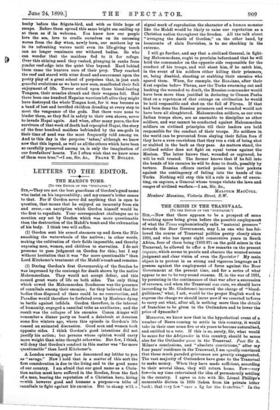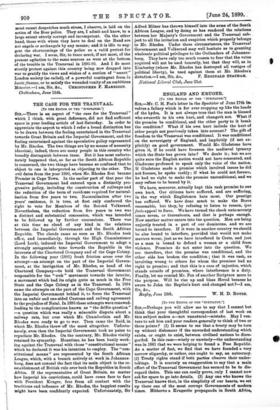THE CRISIS IN THE TRANSVAAL.
[TO THE EDITOR OF THE "SPECTATOR."]
SIR,—Now that there appears to be a prospect of some breathing space being given before the possible employment of what the Times euphemistically calls "material pressure" towards the Boer Government, may I, as one who has fol- lowed the course of Transvaal politics pretty closely since 1880, and who has spent eight consecutive years in South Africa, four of them being (1893-97) on the gold mines in the Transvaal, be allowed to offer a few remarks on the present impasse, which seems to puzzle and obscure the wonted serene judgment and clear vision of even the Spectator ? My main object is to protest in as strong and vigorous language as I possess against the employment of force against the Boer Government at the present time, and for a series of what appear to me to be very sound reasons. If, in the war of 1881, by persisting in the continuance of that war after a succession of reverses, and when the Transvaal was ours, we should have (according to Mr. Gladstone) incurred the charge of "blood- guiltiness," what, I ask, would be the proper English word to express the charge we should incur now if we resorted to force to carry out what, after all, is nothing more than the details of franchise to be given to the Outlanders and to lower the price of dynamite ?
Moreover, we know now that in the hypothetical event of a number of Boers coming to settle in this country, it would take in their case some five or six years to become naturalised, and entitled to a vote. If this is so, surely, Sir, what would be sauce for the Afrigander in this country, should be sauce also for the Outlander goose in the Transvaal. Pace Sir A. Milner's conclusions, and " absolute convictions," after my four years' residence in the Transvaal, I am equally convinced that these much paraded grievances are greatly exaggerated. The vast majority of Outlanders have gone to the Transvaal to make money. When they have made sufficient, according to their several ideas, they will return home. Few—very few—in my time entertained the idea of permanently settling in the country. I agree in toto with Mr. Lionel Phillips's memorable dictum in 1895 (taken from his private letter book), that very few "care a fig for the franchise." In the most recent despatches much stress, I observe, is laid on the action of the Boer police. They are, I admit and know, to a large extent utterly corrupt and incompetent. On the other band, those with whom they have to deal on the Rand are not angels or archangels by any means; and it is idle to sug- gest the shortcomings of the police as a valid pretext for declaring war. I seem, Sir, to trace much, if not most, of the present agitation to the same sources as were at the bottom of the trouble in the Transvaal in 1895.96. And I do most stoutly protest against this country being now dragged into war to gratify the views and wishes of a section of " smart " London society (so called), of a powerful contingent from la haute finance, or to satisfy the wounded vanity of an ambitions Minister.—I am, Sir, &c., CHRISTOPHER F. HARRISON.
Cheltenham, June 15th.



















































 Previous page
Previous page